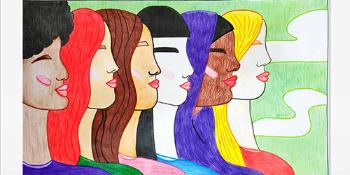Contact Center
.
International Mothers Language Day – Seniors
- Category
- Exhibition
- Date
- 30 September - 30 October 2021
- Venue
- Online Exhibition
Online Art Competition / Exhibition organized by Embassy of Bangladesh in collaboration with Bahrain Authority for Culture and Antiquities and the United Nations Office in Bahrain on the occasion of International Mother Language Day “Fostering multilingualism for inclusion in Education and Society”
Historical Context of 21st February 1952:
Bangladesh’s attachment to this day dates back to 21st February 1952. The Father of the nation of Bangladesh, Bangabandhu Sheikh Mujibur Rahman initiated the language movement in 1948. The mass protest, in course of time, culminated on the 21st February 1952, when, at the instance of the then Government, police fired at the students and public who were peacefully demonstrating on Dhaka streets demanding that Bangla language be accorded the status of a State language (in the erstwhile Pakistan). Several Bengali students and common men were killed by the police. People’s supreme sacrifice on that day in upholding their mother tongue has since remained a milestone in the history of contemporary Bangladesh. Across Bangladesh, 21st February is solemnly observed as the “Language Martyrs’ Day”. Millions of people walk up to Language Memorials barefoot to silently pay floral wreaths
UNESCO Recognition of International Mother Language Day:
In order to protect and save the mother tongue, in 1999, at the initiative of Bangladesh, the General conference of the United Nations Educational, Scientific and cultural organization (UNESCO) proclaimed the International Mother Language Day . The declaration of the day was welcomed by the UN General Assembly in its resolution A/ RES/56/262 of 2002. In its resolution, the United Nations General Assembly called upon member states “to promote the preservation and protection of all languages used by peoples of the world”, to foster unity in diversity and international understanding, through multilingualism and multiculturalism which will in turn promote more tolerance and develop a sense of culture of peace and harmony.








